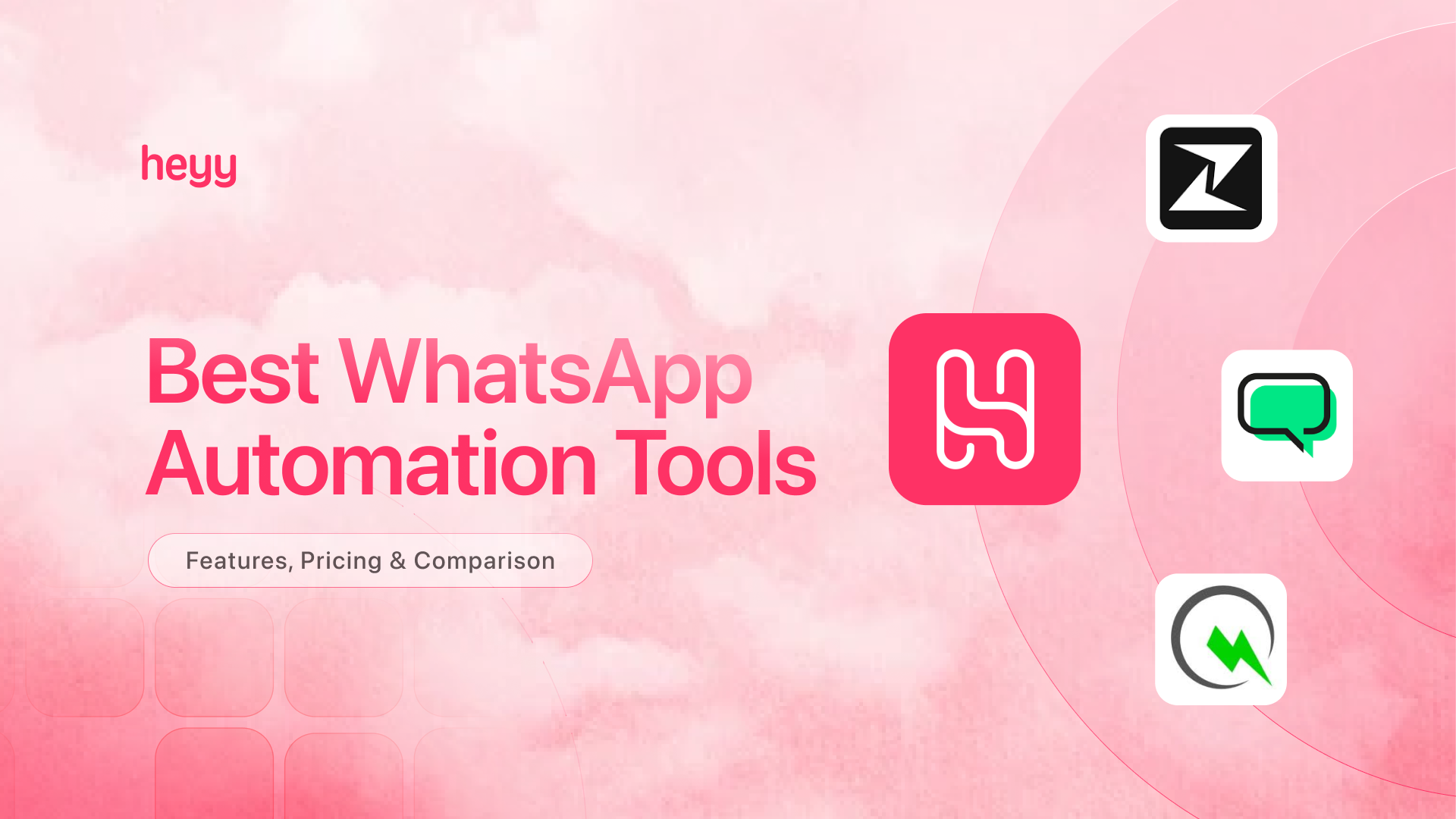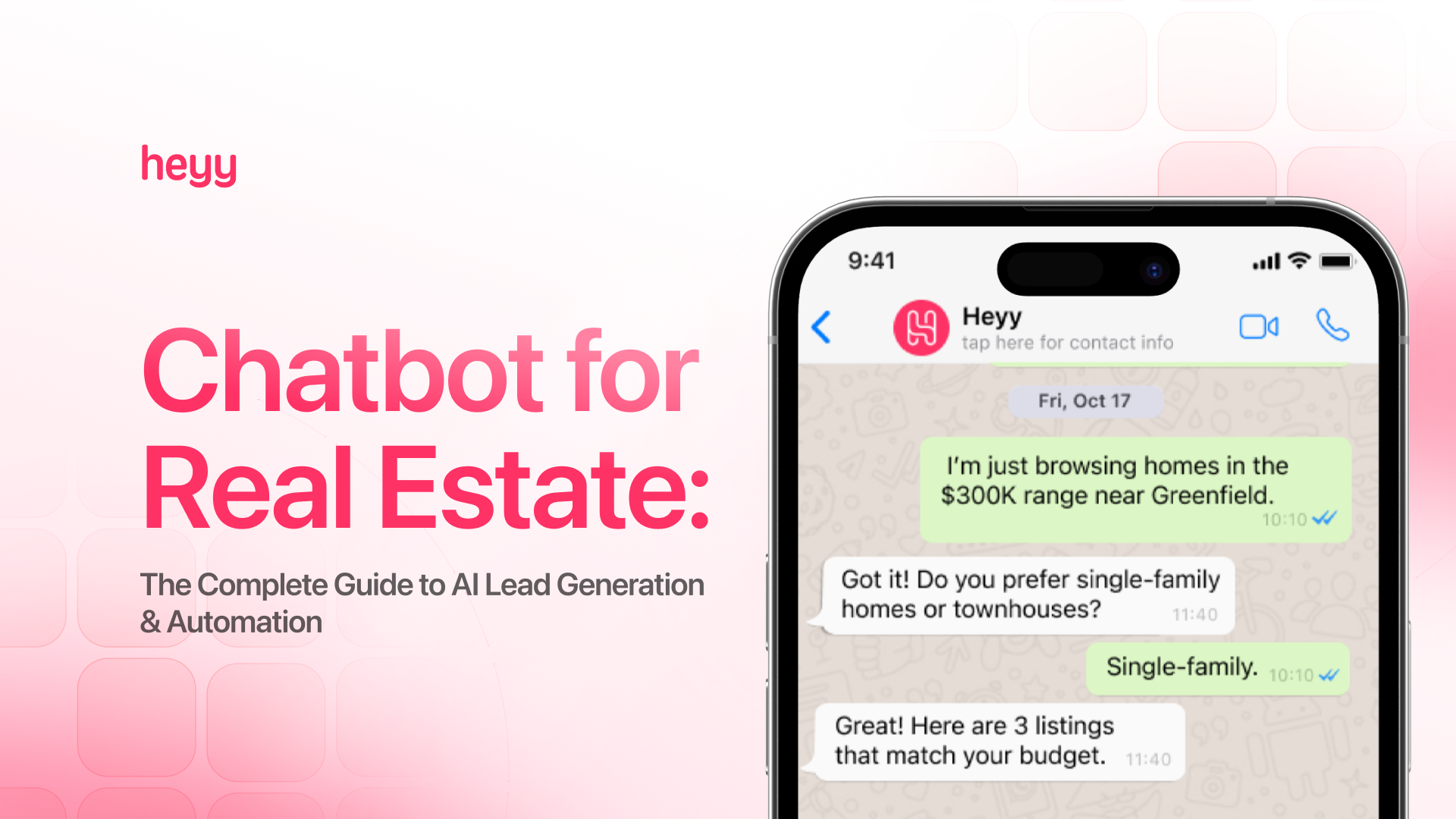Best WhatsApp Automation Tools in 2026: Features & Comparison

175 million people are messaging businesses on WhatsApp every single day. That's a huge number no matter how you look at it.
And that's a huge opportunity for your business if you play your cards right.
And here's the wildest part: WhatsApp messages have a 98% open rate. Compare that to email's lower 21% open rate, and you start to see why enterprises are projected to spend $3.6 billion on WhatsApp Business by 2026. That's up from $38.7 million in 2019, a 9,200% increase in just six years.
But managing WhatsApp manually? Not something you'd want to do if you're running a business that you want to automate on WhatsApp.
That's where WhatsApp automation tools come in. And no, I'm not talking about those sketchy bots that spam people with generic messages and get your number banned.
I'm talking about legitimate platforms that connect to the WhatsApp Business API to automate conversations, qualify leads, handle support tickets, and basically turn WhatsApp into a revenue-generating machine that runs 24/7.
Let's break down what these tools actually do, why they matter for B2B operations, and which ones are worth your budget in 2026.
What Are WhatsApp Automation Tools
WhatsApp automation tools are software platforms that plug into the WhatsApp Business API to handle customer conversations at scale. They act as the infrastructure layer between WhatsApp and your business systems, CRM, help desk, e-commerce platform, whatever you're running.
The idea? Instead of your team manually responding to hundreds (or thousands) of WhatsApp messages daily, the automation tool handles the repetitive tasks while your team focuses on prioritized conversations that need human expertise.
Why WhatsApp Automation Tools Matter in 2026
You've probably heard about the rise in conversational commerce and messaging-first customer service. But let me give you the actual business case for why WhatsApp automation matters right now:
Your Customers Are Already There
Over 3 billion people use WhatsApp monthly. That's nearly 40% of the global population. In markets like India (596 million users), Brazil (148 million), and Indonesia (112 million), WhatsApp is THE primary communication channel so it’s not hard to see why the numbers rack up.
And here's what matters for B2B: 80% of large enterprises are planning to adopt the WhatsApp Business API by 2026. Your competitors are already setting up shop on WhatsApp. If you're not there, you're missing out on a valuable market.
Users open WhatsApp 23-25 times per week, that's 3-4 times daily. When you send a WhatsApp message, 80% get opened within the first five minutes. Try getting that with email.
And it's not just about opens. 83% of consumers say they're willing to browse and buy products directly through messaging apps. WhatsApp is a full sales funnel.
Managing Your Whatsapp Doesn't Lead To Conversions
Let's do some quick math. Imagine you’re getting 100 WhatsApp messages per day and each one takes 5 minutes to handle properly, that's 8+ hours of work just on WhatsApp. Daily.
Now multiply that as your business grows. At 500 messages per day, you'd need five full-time people just managing WhatsApp. At 1,000 messages? Ten people.
Or you could use automation tools that handle 70-80% of routine inquiries automatically and route the complex stuff to your team. Which sounds more scalable?
This ROI Is Measurable
Businesses using WhatsApp chatbots save over 2.5 billion hours annually. Companies report 225% improvement in customer service performance after implementing the WhatsApp Business API.
Top WhatsApp Automation Tools for 2026
Okay, let's get into the actual tools. I've broken these down by what they're best at because no single platform is perfect for everyone. Your choice depends on your use case, team size, and budget.
Best for Multi-Channel Conversational Commerce: Heyy
Let me start with Heyy because it's built specifically for businesses that need to manage conversations across multiple channels, not just WhatsApp.
What makes it different: Most WhatsApp automation tools treat each channel separately. Your Instagram DMs are in one place, WhatsApp in another, Facebook Messenger somewhere else. Heyy brings everything into a unified inbox with intelligent automation across all channels.
Best for: E-commerce businesses, service providers, agencies managing multiple clients, basically anyone who needs to handle high-volume conversations across WhatsApp, Instagram, Facebook Messenger, and web chat.
Key features:
- Cross-platform automation (one chatbot flow works across WhatsApp, Instagram, Messenger)
- Smart conversation routing based on customer intent
- Built-in CRM for tracking customer journey
- Broadcast campaigns with personalization
- No-code conversation builder (seriously, if you can use a flowchart, you can build automation)
Pricing: A free forever option, that's, well, free forever! Also if you choose to upgrade, there's transparent, usage-based pricing that scales with your business needs.
The thing I like about Heyy? It's designed for actual business use cases. You can set up lead qualification, appointment booking, order tracking, and customer support flows without needing a developer on your team.
Best for CRM-Focused Automation: Zixflow
Zixflow positions itself as an all-in-one CRM with built-in WhatsApp automation. If you're looking to replace multiple tools with one platform, this is worth looking at.
Best for: Sales teams that live in their CRM, businesses that want WhatsApp + email + SMS automation in one place.
Key features:
- CRM with built-in WhatsApp Business API access
- Drip campaigns across WhatsApp, email, and SMS
- Contact segmentation and lead scoring
- WhatsApp broadcast with personalization
- Team collaboration features
Why it works: You're not constantly switching between your CRM and your WhatsApp tool. Everything lives in one place, which actually matters when you're managing hundreds of customer relationships.
Best for Customer Support Teams: Wati
Wati is focused on customer support use cases. If you're getting bombarded with support inquiries on WhatsApp, Wati's got the features you need.
Best for: Support teams, businesses with high ticket volumes, companies that need team collaboration on WhatsApp conversations.
Key features:
- Shared team inbox for WhatsApp
- Automated ticket assignment
- Canned responses and templates
- Analytics on response times and resolution rates
- Integration with help desk tools like Zendesk and Freshdesk
Why it's good: The team collaboration features are solid. Multiple agents can handle WhatsApp conversations without stepping on each other's toes, and managers get visibility into team performance.
Best for Quick Setup: QuickReply
QuickReply lives up to its name, it's designed for businesses that want to get WhatsApp automation running fast without a ton of configuration.
Best for: Small teams, businesses new to WhatsApp automation, anyone who wants something simple that just works.
Key features:
- Template library with pre-built automation flows
- Quick setup (literally minutes, not days)
- Basic chatbot builder
- WhatsApp broadcast campaigns
- Contact management
The trade-off: You sacrifice some customization for speed. But if you just need basic automation working ASAP, this does the job.
Best for High-Volume Broadcasting: WappBlaster
WappBlaster specializes in bulk messaging and campaign management. If your primary use case is marketing campaigns rather than two-way conversations, check this out.
Best for: Marketing teams, promotional campaigns, product launches, businesses focused on outbound messaging.
Key features:
- Bulk message sending
- Campaign scheduling
- Contact list management
- Message templates
- Analytics on delivery and engagement rates
The catch: It's more about broadcasting than two-way conversations. If you need sophisticated chatbot flows or customer support features, look elsewhere.
Best for Conversational Marketing: WaMessages
WaMessages focuses on using WhatsApp for marketing automation with a strong emphasis on conversational flows.
Best for: Growth marketers, e-commerce brands, businesses running multiple campaigns simultaneously.
Key features:
- Drip campaign builder for WhatsApp
- A/B testing for messages
- Segmentation based on user behavior
- Click tracking and attribution
- Integration with marketing tools
Why it's useful: You can actually test what messages work best instead of just guessing. The A/B testing and analytics help you optimize your WhatsApp marketing like you would with email campaigns.
Best for AI-Powered Conversations: AiSensy
AiSensy leans heavily into AI and natural language processing to create more intelligent chatbot conversations.
Best for: Businesses that need complex conversation flows, companies dealing with nuanced customer inquiries, tech-forward teams.
Key features:
- AI-powered chatbot with NLP
- Smart intent recognition
- Automated lead scoring
- WhatsApp broadcast campaigns
- Advanced analytics and reporting
What sets it apart: The AI actually gets better over time as it learns from conversations. If you're dealing with complex products or services where customers ask varied questions, this helps.
Best for Email + WhatsApp Marketing: Brevo
Brevo (formerly Sendinblue) started as an email marketing platform and added WhatsApp automation. If you're already doing email marketing, this makes sense.
Best for: Marketing teams already using email automation, businesses wanting unified messaging across channels.
Key features:
- Email + SMS + WhatsApp in one platform
- Marketing automation workflows
- Transactional messaging
- Contact management
- Campaign analytics across channels
The benefit: You can create customer journeys that span email, SMS, and WhatsApp instead of treating them as separate channels. Send a cart abandonment email, follow up with a WhatsApp message, then an SMS reminder, all automated.
Best for Customer Engagement: Interakt
Interakt is built specifically for e-commerce brands and focuses on the entire customer lifecycle on WhatsApp.
Best for: E-commerce businesses, online stores, brands with significant cart abandonment issues.
Key features:
- Order notifications and updates
- Cart abandonment recovery
- Product catalog integration
- Customer segmentation
- Payment collection via WhatsApp
Why e-commerce brands like it: You can share product catalogs directly in WhatsApp, send order confirmations, shipping updates, and even collect payments without customers leaving the app.
Best for No-Code Simplicity: Gallabox
Gallabox positions itself as the easiest no-code WhatsApp automation platform. If your team isn't technical, this is worth considering.
Best for: Non-technical teams, small businesses without developers, agencies building solutions for clients.
Key features:
- Drag-and-drop chatbot builder
- Pre-built templates for common use cases
- Team inbox for collaboration
- Basic CRM functionality
- Simple analytics dashboard
What makes it accessible: You literally don't need to know any code. The visual builder and templates mean you can have automation running in under an hour.
Best for SMB Growth: Growby
Growby targets growing businesses that need WhatsApp automation without enterprise pricing.
Best for: Small to medium businesses, startups scaling their customer communication, budget-conscious teams.
Key features:
- WhatsApp Business API access at affordable rates
- Chatbot automation
- Broadcast messaging
- Contact management
- Team collaboration
The appeal: Enterprise-level features at SMB-friendly pricing. You get official API access without paying through the nose for it.
Best for Enterprise Scale: Gupshup
Gupshup is one of the largest conversational messaging platforms globally, handling billions of messages monthly.
Best for: Enterprises, high-volume operations, businesses needing 99.9% uptime SLAs, global operations.
Key features:
- Enterprise-grade infrastructure
- Advanced API capabilities
- Multi-country deployment
- Dedicated support and onboarding
- Custom integrations
Why enterprises choose it: When you're sending millions of messages monthly, you need infrastructure that won't break. Gupshup has that scale, plus the enterprise support and compliance features that large organizations require.
Common Mistakes to Avoid With WhatsApp Automation
Let me save you from the mistakes I've seen companies make repeatedly:
Mistake #1: Treating WhatsApp Like Email
WhatsApp is conversational. It's personal. It's immediate. If you just push out promotional messages like you would with email, you'll annoy people and they'll block you.
Use WhatsApp for conversations, support, and personalized updates. Save the mass promotional blasts for email.
Mistake #2: Over-Automating Everything
Not every conversation should be automated. VIP customers reaching out with concerns? That needs a human. Complex technical questions? Human. Someone trying to negotiate a deal? Definitely human.
Use automation for repetitive, routine stuff. Keep humans involved for anything that needs judgment, empathy, or complex decision-making.
Mistake #3: Ignoring WhatsApp's Policies
Meta has strict rules about what you can and can't do on WhatsApp Business. Break them and you risk losing API access entirely.
Important rules to follow:
- Only message people who've opted in
- Use approved message templates for outbound messages
- Respond to inquiries within 24 hours for free
- Don't spam people with unwanted promotions
- Include clear opt-out options
Read WhatsApp's Business Policy before launching any campaigns. It's boring but necessary.
Mistake #4: Setting It Up and Never Optimizing
Your first automation setup probably won't be perfect. That's fine. What's not fine is launching it and never improving it.
Schedule monthly reviews to look at:
- What questions is the bot failing to answer?
- Where are people dropping off in conversations?
- What manual interventions happen most often?
- Which messages get the best response rates?
Use this data to continuously improve your automation. The companies getting the best ROI from WhatsApp automation are the ones constantly tweaking and optimizing.
Mistake #5: Not Training Your Team
Your team needs to know how to use the tool, sure. But they also need to understand:
- When to let automation handle things vs. when to jump in
- How to review conversation logs and identify issues
- WhatsApp's policies and compliance requirements
- Best practices for messaging tone and style
Don't just turn on your automation, train your team on it.
As your business grows, you'll either need to hire an army of people to handle messages, or you'll miss conversations and lose customers.
WhatsApp automation tools solve this problem. They let you stay responsive 24/7, handle routine inquiries automatically, and scale your customer communication without scaling your team proportionally.
Ready to Automate Your WhatsApp Communication?
Start simple. Try Heyy.
If you're looking for a platform that handles WhatsApp along with Instagram, Facebook Messenger, and web chat in one unified system, Heyy is worth checking out. It's specifically built for businesses that need to manage high-volume conversations across multiple channels without losing the personal touch.
Automate just that one thing. See how it works. Measure the impact. Then expand.
You can use Heyy free forever, Click here to get started.
More blog posts to read

Ready to Automate Support
Across Every Channel?
.svg)
.avif)
.svg)

